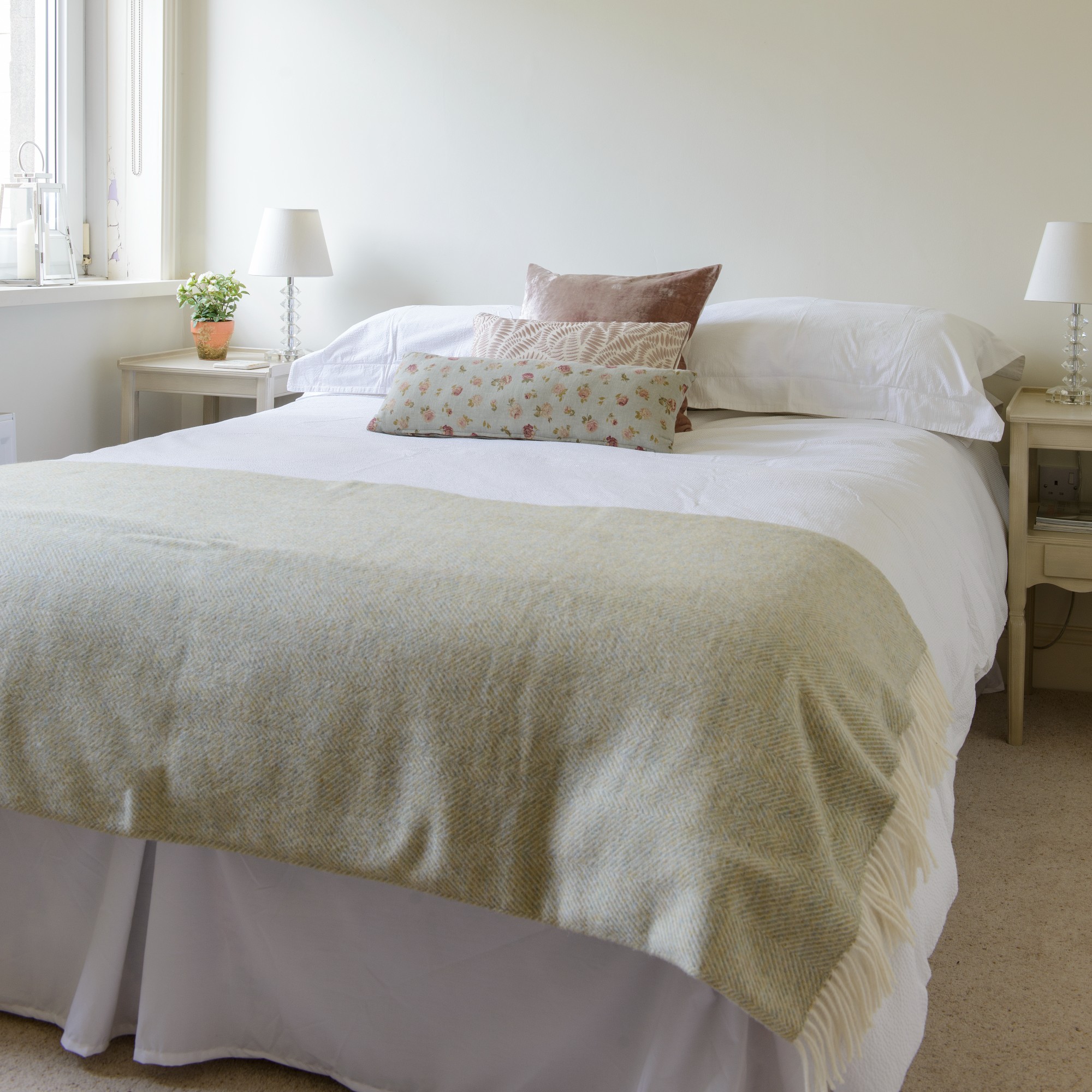
Wondering how to recycle a mattress? We've asked the experts for their top tips on disposing of a mattress responsibly.
After all, if you’ve replaced your old, lumpy mattress with one of the best mattresses on the market, you don’t want the old one hanging around and taking up space in your home or garden.
And whilst there are many methods for how to get rid of a mattress, they’re not always the most eco-friendly options, and some can end up doing more harm than good.
How to recycle a mattress
‘Over 5 million mattresses (equivalent to 167,000 tonnes) end up in landfill every year in the UK, and all these mattresses could and should be recycled,’ explains Andrew Seed, owner and managing director of mattress brand The Odd Company.
'When mattresses aren’t disposed of correctly, they can contribute significantly to landfill waste, and the decomposition process releases harmful chemicals into the environment', continues Fabio Perrotta, director of buying at mattress retailer Dreams.
'Recycling old mattresses prevents these environmental risks and helps reduce our overall carbon footprint. Additionally, manufacturing new mattresses involves a lot of resource consumption, including raw materials and energy. By recycling old mattresses, we can help conserve these valuable resources and promote a more sustainable future.'
Recycling a mattress involves using the old components of the mattress – from the springs to the foam and the fabric – to make something new. But how do you do this? We’ve consulted with the experts to share with you everything you need to know about how to recycle a mattress.

1. Arrange removal and recycling when your new mattress is delivered
Although some people may have spare old mattresses lying around, most want to dispose of an old mattress when they buy a new one.
Thankfully, mattress retailers have made this easier than ever, with many retailers offering free mattress recycling services when they deliver your new mattress, or allowing you to book a pick-up for a small additional fee.
This means that they will not only deliver your new mattress, but they’ll then take your old one away for recycling at the same time. Below, you’ll find a list of retailers that offer this service:
- Argos: More and more companies are getting on board with furniture recycling, and Argos is one of them. If you buy a new mattress from them, you can add its mattress recycling service to your order for just £30. You can then choose a collection day of your choosing, and the delivery drivers will bring a bag for your old mattress with them on the day.
- Bensons for Beds: Buying from Bensons for Beds? You can recycle your old mattress with the company for just £45 per mattress. You can also recycle a divan base for an extra £45 and a headboard for an extra £25. If you’re looking for another eco-friendly way to dispose of your old mattress, Bensons also offers a free mattress collection service in collaboration with the British Heart Foundation. Instead of being recycled, if your old mattress is in good condition it will be re-sold in BHF shops to raise money for the charity.
- Dreams: If you buy a new mattress from Dreams, you can take advantage of their recycling service. This will cost you £20 for a single mattress, £50 for a double mattress, or £55 for a king or super king mattress, and this can be added to your new order at checkout. Dreams will also send you a bag ahead of the collection so you can wrap up your old mattress before the delivery team arrives.
- Dunelm: Yes, Dunelm has now added another string to its bow and has partnered with the British Heart Foundation and Clearabee to recycle and repurpose your old mattress. If you want to donate to the British Heart Foundation, you need to ensure that the mattress is clean, has no soiled areas, and still has its fire label attached to it. If not, Clearabee may be your best bet. They aim to divert 95% of their collections away from landfill.
- DUSK: If you love DUSK products as much as we do, you’ll be happy to know that this brand offers a mattress recycling service on all new mattress orders. This will set you back £30 per mattress and is only available on a like-for-like swap and not available for anyone not buying a DUSK mattress.
- John Lewis: John Lewis sells a whole host of impressive mattress brands, and if you buy through this company, you have the option to add mattress recycling to your order. The charge for this service is £29.95, and all you need to do is make sure your mattress is clean and free from bed linen before collection.
- MattressNextDay: When buying a new mattress from MattressNextDay, you can simply add a recycling service to your order. This will set you back £39 per mattress, and they work with the Furniture Recycling Group to ensure 100% of the mattress is recycled and used.
- M&S: M&S offers a mattress disposal service. This costs £29 per mattress, and you can even choose to buy this service on finance. It will cost you £2.42 per month over 12 months or £1.21 per month over 24 months.
- Simba: The best thing about Simba (aside from the high-quality mattresses) is that you don’t actually have to be a customer to use its mattress recycling service. Of course, you can add this to checkout if you’re looking to buy a new Simba mattress. But if you’re just looking to get rid of an old, spare mattress, you can do this as a standalone service for £50.

2. Book a reputable recycling company
If the brand you buy your new mattress from doesn't offer a recycling service for your old one, then you can book a mattress removal and recycling collection independently.
There are many companies out there that specialise in bulky waste removal and recycling, and these can come in handy if you’re looking to recycle an old mattress.
For example, Clearabee will charge you £40 for mattress removal, First Mile offers a zero-landfill mattress recycling option from £50, and The Mattress Recycling People will collect and recycle any-size mattress for £44.99.
When booking a mattress removal company, just make sure that the organisation clearly states how the mattress will be recycled. Not all mattress removal companies recycle the products, and it's important to ensure the mattress isn't just going to landfill.
And remember that you should NEVER fly-tip a mattress. As a spokesperson for mattress manufacturer Winstons Beds advises, 'for some, it can be tempting just to fill up the boot and dump everything in a quiet spot, but this is never ever acceptable. We are urging all our customers to dispose of their unwanted mattress in a responsible and carefully considered manner.'
If you needed any more incentive to dispose of a mattress responsibly, fly-tipping is against the law and can incur a hefty fine.
This is also why you should also never dump a mattress at your local waste centre without prior agreement with your local council.
How a mattress is recycled
Although a good quality mattress can last anywhere between 10 to 15 years, it’s important to know how often you should change your mattress. But the life of your mattress doesn’t have to end when it’s no longer needed in your bedroom.
When mattresses are recycled, the top layer is stripped from the interior, revealing the different materials inside – whether that be memory foam, springs, latex, wool, or even silk.
Then, the interior components are separated into their different categories, sanitised, and then compressed together to be sent to the companies and factories who can re-use these materials for their own products.

How each part of a mattress is recycled
Mattresses may seem relatively simple in terms of their general makeup and design, but the inside of a mattress is a treasure trove of material that shouldn’t go to waste. Almost every part of a mattress can be recycled, and here’s a low-down of how:
Foam: Both hybrid and memory foam mattresses are made from foam, and this foam can come in very handy for those in the carpet industry. In fact, almost all recycled mattress foam is repurposed for use as carpet underlay. In some cases, however, it may also be sent to a waste-to-energy plant to produce energy.
Metal springs: If you have a hybrid, open-coil or pocket spring mattress, then the metal used in these springs can also be recycled. Generally, the metal springs from these mattresses are melted down and then used to make alternative metal products.
Wadding: The filling of a mattress is called wadding, and every mattress – aside from some memory foam mattresses – is full of this wadding. In cheaper mattresses this is often a polyester blend, which can be difficult to recycle. Nevertheless, ‘Wadding can be used to restuff pillows, bedding, mattresses and even sometimes as insulation,’ explains Stephany Aubrey, Brand Specialist at Zinus. A mattress filled with natural wadding – such as cotton or wool – is the best for the environment as this wadding will naturally biodegrade if it can't be repurposed.
Mattress fabric: The top of every mattress is covered in some kind of fabric, but this is usually a low-grade fabric that has very little recycling value. Because of this, mattress covers are often sent to waste-to-energy plants.

FAQs
How do I dispose of a mattress for free UK?
If your mattress is in good condition then you may be able to donate it to a charity which will collect and remove it from your home for free, or you could try listing it on a second-hand selling site.
If your mattress isn't in good enough condition for donation or resale then some mattress retailers will collect your old mattress for free when they deliver your new one.
Will the local council collect an old mattress?
Many local councils will come and collect an old mattress, but it’s unlikely that they’ll do this for free, and it isn't guaranteed that the mattress will be recycled, instead it may end up in landfill.
The best way to find out whether your local council will collect an old mattress is to check your local council’s website.
However, it can often be cheaper, easier, and more sustainable to pay for an expert recycling service to collect your mattress and dispose of it responsibly.
Take this as your reminder to recycle your old mattress to stop even more mattresses from ending up in landfill.







